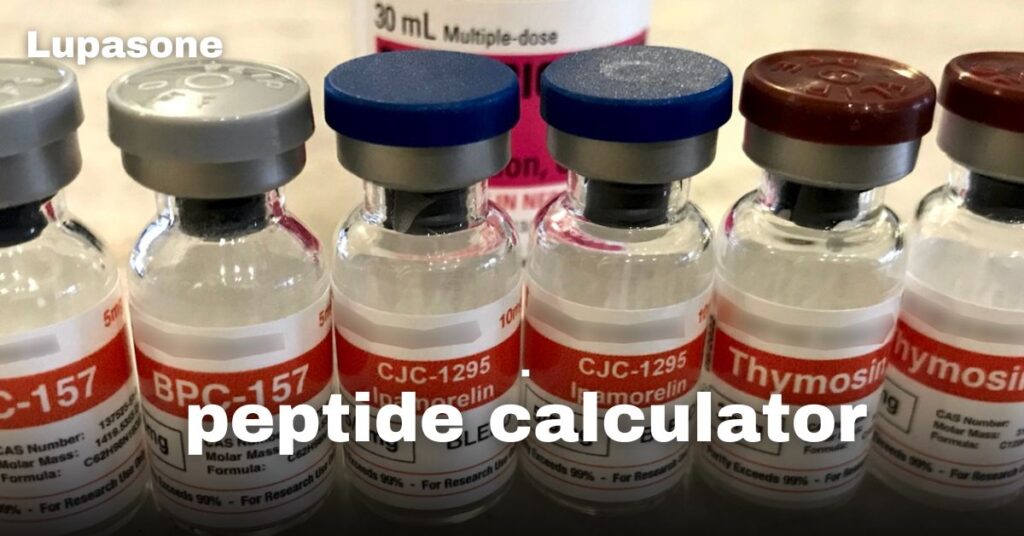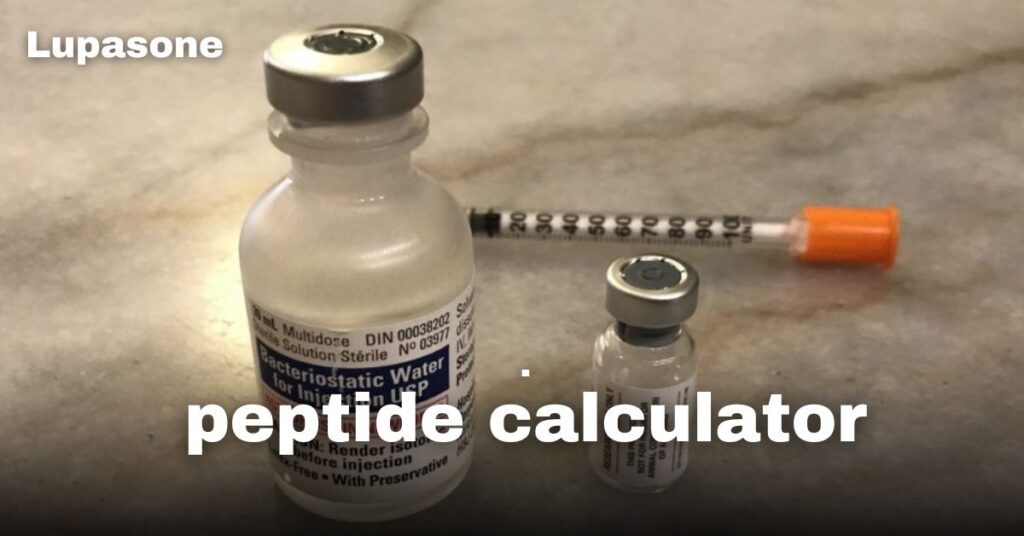
Contents
- 1 Introduction
- 2 What is a Peptide Calculator?
- 3 How a Peptide Calculator Works
- 4 Why Accuracy is Important in Peptide Calculations
- 5 Using a Peptide Calculator: Step-by-Step Guide
- 6 Types of Peptide Calculators and Their Applications
- 7 Common Mistakes to Avoid When Using a Peptide Calculator
- 8 Frequently Asked Questions About Peptide Calculators
- 8.1 What is a peptide calculator used for?
- 8.2 Can I use a peptide calculator for any type of peptide?
- 8.3 How do I know how much diluent to use when reconstituting peptides?
- 8.4 What’s the difference between mg and mcg in peptide dosages?
- 8.5 Is manual calculation more accurate than using an online calculator?
- 8.6 Can a peptide calculator be used for medical treatments or only research?
- 9 Conclusion
- 10 Takeaway Points
Introduction
Peptides, a class of molecules composed of amino acids, have gained significant attention in various fields, including research, medicine, and fitness. Accurately calculating peptide dosages is crucial for achieving desired results and avoiding potential side effects. That’s where a peptide calculator comes into play.
In this guide, we’ll explore what a peptide calculator is, its importance, and how to use it effectively. We’ll also discuss the different types of peptide calculators available and their specific functions.
What is a Peptide Calculator?
Overview of Peptides
Peptides consist of short chains of amino acids, which are the fundamental building blocks of proteins.. They play vital roles in various biological processes, making them a subject of increasing interest in research, medicine, and fitness.
Accurately measuring peptide dosages is crucial for achieving desired results and avoiding potential side effects. This is where a peptide calculator comes into play.
Defining a Peptide Calculator
A peptide calculator is a tool designed to help you determine the correct dosage and reconstitution of peptides. It simplifies the process of converting milligrams (mg) of peptides into the desired dosage per injection volume (e.g., micrograms, milliliters).
Whether you’re a seasoned researcher or a beginner in the field of peptides, a peptide calculator can be a valuable asset. It streamlines the process and ensures accurate dosing, which is essential for optimal outcomes.
How a Peptide Calculator Works

The Basic Formula
A peptide calculator uses a simple formula to determine the correct dosage:
Peptide concentration (mg/mL) = Total peptide weight (mg) / reconstitution volume (mL)
This formula helps you calculate the concentration of the peptide solution based on the amount of peptide and the volume of diluent used.
Understanding Key Inputs
To use a peptide calculator effectively, you’ll need to provide the following information:
- Peptide weight: This is the total amount of peptide you have (measured in milligrams).
- Desired dosage: This is the amount of peptide you want to inject per dose (measured in micrograms or milligrams).
- Volume of diluent: This is the amount of liquid (e.g., sterile water or bacteriostatic water) you’ll use to dissolve the peptide.
Calculating Dosage per Injection
Once you have these inputs, the peptide calculator will help you determine the correct dosage per injection. For example, if you have a 10 mg peptide and want a 1 mg dose, the calculator will tell you how much of the reconstituted solution to inject.
To use a peptide calculator:
- Enter the total peptide weight (in mg).
- Enter the desired dosage (in micrograms or milligrams).
- Enter the volume of diluent used (in milliliters).
- The calculator will then provide the calculated dosage per injection.
By following these steps, you can ensure that you’re administering the correct amount of peptide for your specific needs.
Why Accuracy is Important in Peptide Calculations
Avoiding Overdose or Underdose
Incorrect peptide calculations can lead to serious consequences, such as overdose or underdose. Overdosing can cause adverse side effects, while underdosing may render the treatment ineffective.
In research settings, precise peptide calculations are crucial for reproducibility and reliable results. If other researchers cannot replicate your findings due to incorrect dosing, the validity of your research is compromised.
Role of Precision in Therapeutic and Fitness Use
In medical and fitness contexts, peptide dosages must be precise to ensure safety and efficacy. For example, growth hormone-releasing peptides used for therapeutic purposes require accurate dosing to avoid potential side effects and achieve optimal results.
Legal and clinical guidelines often emphasize the importance of precision in peptide use. Adhering to these guidelines is essential for maintaining safety and avoiding legal issues.
Consistency in Long-Term Peptide Use
If you’re using peptides for long-term treatments or experiments, consistency in dosing is crucial. Inconsistent dosages can lead to unpredictable results and hinder the effectiveness of the treatment.
There are many examples of failed research or adverse health outcomes due to inconsistent peptide dosing. By using a peptide calculator to ensure accuracy, you can avoid these pitfalls and maximize the benefits of peptide therapy.
Using a Peptide Calculator: Step-by-Step Guide
Step 1: Determine the Peptide Weight
Begin by identifying the weight of the peptide, which is usually labeled on the vial. For example, you might have a 10 mg vial of a particular peptide.
Step 2: Choose the Volume of Diluent
The next step is to select the appropriate diluent, such as bacteriostatic water or sterile water. The amount of diluent you’ll need will depend on the desired concentration of the peptide solution.
It’s important to measure the diluent accurately using a syringe or pipette. Adding too much or too little diluent can affect the final concentration of the peptide solution.
Step 3: Input the Desired Dosage
Once you have the peptide weight and diluent volume, you can enter your desired dosage into the peptide calculator. The dosage will depend on the specific application of the peptide, such as medical treatment, research, or fitness.
For example, if you’re using a growth hormone-releasing peptide for muscle growth, you may want a dosage of 500 micrograms per injection.
Step 4: Calculate Injection Volume
After entering the necessary information, the peptide calculator will determine the volume of solution you need to inject to achieve your desired dosage.
For instance, if you have a 10 mg peptide reconstituted with 2 mL of water, and you want a 500 mcg dose, the calculator might tell you to inject 0.1 mL of the solution.
By following these steps and using a peptide calculator, you can ensure that you’re administering the correct dosage of peptides for your specific needs.
Types of Peptide Calculators and Their Applications
Online Peptide Calculators
There are numerous online peptide calculators available that can simplify the dosing process. These tools are often user-friendly and provide automatic calculations, making them convenient for both beginners and experienced users.
Mobile Apps for Peptide Calculation
For those who are constantly on the go, mobile apps offer a convenient way to access peptide calculators. These apps are designed to provide quick and easy calculations right at your fingertips. Some apps may also include additional features such as saving previous calculations, dosage reminders, or built-in databases of diluent information.
Manual Calculation for Experienced Users
While peptide calculators are a valuable tool, some experienced users may prefer to perform manual calculations using formulas. This approach can be useful for those who want a deeper understanding of the underlying principles or for specific applications that require more customization.
However, it’s important to note that manual calculations can be more time-consuming and prone to errors. Using a peptide calculator can help ensure accuracy and efficiency.
Common Mistakes to Avoid When Using a Peptide Calculator
Incorrect Peptide Weight Input
One of the most common mistakes when using a peptide cal is entering the wrong peptide weight. Always double-check the label on the peptide vial to ensure you have the correct weight before inputting it into the calculator.
Wrong Diluent Volume
Another common error is using the wrong amount of diluent. Measuring the diluent incorrectly can significantly affect the concentration of the peptide solution. It’s important to use accurate measurement tools and follow the instructions provided by the peptide manufacturer.
Misunderstanding Dosage Units
It’s also common to confuse milligrams (mg) and micrograms (mcg) when calculating dosages. Just a reminder: 1 milligram (mg) is equivalent to 1000 micrograms (mcg).. Make sure you understand the units used in your peptide calculator and double-check your calculations to avoid errors.
Frequently Asked Questions About Peptide Calculators
What is a peptide calculator used for?
A peptide calculator is a tool used to determine the correct dosage and reconstitution of peptides. It helps you calculate the amount of peptide solution to inject based on the desired dosage and the total amount of peptide available.
Can I use a peptide calculator for any type of peptide?
Yes, peptide calculators can be used for various types of peptides, including those used in research, medical treatments, and fitness. However, it’s essential to ensure that the calculator is designed for the specific type of peptide you’re working with.
How do I know how much diluent to use when reconstituting peptides?
The amount of diluent you’ll need will depend on the desired concentration of the peptide solution. Refer to the instructions provided by the peptide manufacturer or consult a peptide calculator.
What’s the difference between mg and mcg in peptide dosages?
- mg: Milligrams (mg) are a unit of mass.
- mcg: Micrograms (mcg) are a smaller unit of mass, equal to one-millionth of a gram.
When using a peptide calculator, it’s important to ensure that you are using the correct units for peptide weight and dosage.
Is manual calculation more accurate than using an online calculator?
While manual calculations can be accurate, online peptide calculators are often designed to provide precise results. However, it’s always a good idea to double-check your calculations, especially if you’re new to using peptide calculators.
Can a peptide calculator be used for medical treatments or only research?
Peptide calculators can be used for both research and medical applications. However, it’s crucial to consult with a healthcare professional or follow specific guidelines for medical treatments.
Conclusion
A peptide cal is an invaluable tool for anyone working with peptides, whether you’re a researcher, athlete, or medical professional. By accurately calculating peptide dosages, you can ensure optimal results and avoid potential risks.
Remember to use a peptide calculator correctly and avoid common mistakes like incorrect weight input or diluent volume. Explore the different types of calculators available to find the one that best suits your needs.
With a peptide calculator, you can confidently and safely use peptides in your research or personal endeavors.
Takeaway Points
A peptide calculator is an essential tool for ensuring accurate dosages in peptide research, medical applications, and fitness routines. By using a peptide cal correctly, you can:
- Avoid overdose or underdose: Precise calculations prevent harmful side effects and ensure optimal results.
- Maintain consistency: Consistent dosing is crucial for long-term treatments and experiments.
- Choose the right tool: Explore different types of calculators to find the one that best suits your needs.
Remember to double-check your inputs and avoid common mistakes to ensure accurate calculations and successful peptide use.
Visit Home For More Articles
Recommended



